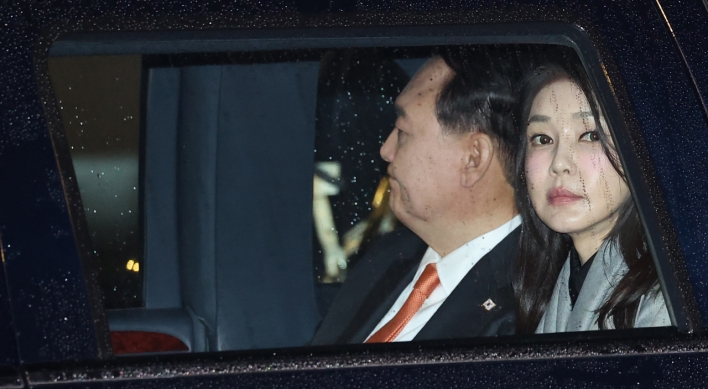Hyundai Motor Group chairman Chung Mong-koo said Thursday that he agrees with the “general frame” of the government’s economic democratization initiative, hinting that Hyundai is playing its part well.
“We know the direction where Hyundai should be headed,” Chung told reporters ahead of a dinner he hosted for Prime Minister Chung Hong-won and the Federation of Korean Industries, the mouthpiece for local conglomerates.
Hyundai recently decided to add more small and mid-sized suppliers to its list of subcontractors to offer them up to 600 billion won of contracts that previously went to Hyundai affiliates. Separately, the carmaker recently said it would make a facility investment of up to 1.1 trillion won to create some 22,000 new jobs.
Chung did not rule out the possibility of more facility investment.
The FKI invited the prime minister for what it called “a routine meeting with newly appointed premiers.” Chairman Chung, who appeared for the first time since 2011 to such a program, picked up the dinner tab.
However, the timing of the event was sensitive, as local conglomerates have been raising concerns over the host of controversial bills aimed at enhancing employee welfare, but has the potential of eroding the corporate sector’s growth momentum.
Some of the bills, such as one promoting the extension of the retirement age, drew criticism and complaints from the corporate sector for being costly and premature.
The FKI consequently requested for the government to help prevent these bills from negatively impacting normal corporate activity.
“We agree with the values of fair trade and mutual growth, but we also hope that these regulations do not affect normal corporate activity,” the federation said in a statement. “We are particularly opposed to bills involving excessively harsh punishments and those that are simply too much for companies to handle.”
Regarding the falling yen, chairman Chung told reporters that “the government’s finance team will have to decide whether or not it was pre-planned or a coincidence.”
Companies such as Hyundai that depend on exports have been hard hit by the depreciating yen, coupled with the persisting concerns over Europe’s economic slowdown.
Under such pressure, the corporate sector has been at odds with the Park government, which was elected on the platform of economic democratization.
By Kim Ji-hyun
(jemmie@heraldcorp.com
-
Articles by Korea Herald



![[AtoZ Korean Mind] Does your job define who you are? Should it?](http://res.heraldm.com/phpwas/restmb_idxmake.php?idx=644&simg=/content/image/2024/05/06/20240506050099_0.jpg&u=)















![[K-pop's dilemma] Is Hybe-Ador conflict a case of growing pains?](http://res.heraldm.com/phpwas/restmb_idxmake.php?idx=642&simg=/content/image/2024/05/07/20240507050746_0.jpg&u=)